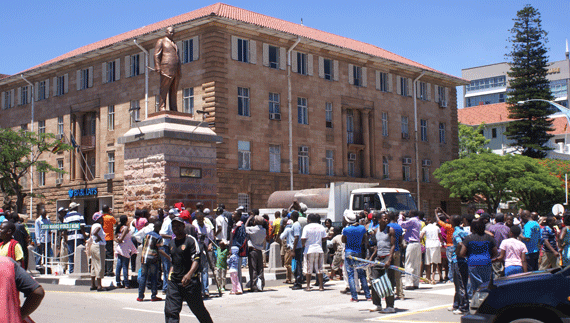
BULAWAYO has reached 120 years of existence and celebrations to mark the 120th anniversary were recently held in Bulawayo with a train ride to Figtree.
We read a lot in the newspapers how the city grew to become a hub of industrial activity, with such companies as the National Railways of Zimbabwe and the Cold Storage Commission taking a notable lead, up until their recent low productivity.
There is more to Bulawayo than the rise and fall of its companies.
The spirit of ubuntu/hunhu evident among the people of Bulawayo and their accommodative spirit and cultures stand out above the rest in its 120 years of existence.
The history of Bulawayo is not complete without the mention of the role it played in facilitating the rise of the people’s movements in Zimbabwe.
For 86 years Bulawayo like all places in Zimbabwe, was under colonial rule and black people were subjected to all forms of segregation and discrimination by the settler regime.
We are all familiar with the nature of oppression the citizens were subjected to until the attainment of independence in 1980.
The 1950s saw the rise of political movements spearheaded by trade unionists and other politically-conscious leaders, who organised the masses to resist colonial rule.
- Chamisa under fire over US$120K donation
- Mavhunga puts DeMbare into Chibuku quarterfinals
- Pension funds bet on Cabora Bassa oilfields
- Councils defy govt fire tender directive
Keep Reading
Much of this activity was taking place in Bulawayo, with the likes of Benjamin Burombo, James Chikerema, Masotsha Ndlovu, Joshua Nkomo and others leading the way.
Political parties such as the National Democratic Party and later Zapu, were banned by the colonial regime, thus giving rise to more uprising and underground political operations.
Beer gardens that were littered all over African townships were a blessing as they were used for sharing political mobilisation strategies and also as platforms for organising work stay-aways and the popular zhii demonstrations.
People from different regions of the country who were resident in Bulawayo would meet at beerhalls for social interaction and would perform cultural dances while at the same time joining in political discussions.
In the 1950s and ’60s, the political liberation movement atmosphere was more pronounced in Bulawayo than in any other parts of the country. Political ideas from Bulawayo later spread to all parts of the country with more people joining in the struggle to fight for independence.
The spirit of the liberation struggle prevailing at that time in Bulawayo made some people love and care for one another. One such person was Jairos Jiri who started support and care programmes for persons with disabilities in Nguboyenja in the 1950s.
His first rehabilitation centre opened its doors in the 1960s. This work started with the support of the people of Bulawayo has spread all over the country and today there are around twenty Jairos Jiri schools, vocational and rehabilitation centres scattered all over the country.
In the 1970s the disability rights movement was mooted in Bulawayo with the likes of Sabbath Maturure, Albert Mthupha, Joshua Malinga and others spearheading the founding of the National Council of Disabled Persons of Zimbabwe. At the same time the Zimbabwe National League of the Blind was also founded.
Joshua Malinga, besides his active role in the founding of the Disabled Peoples International, a world-wide lobby and advocacy movement of persons with disabilities, he later became the mayor of the City of Bulawayo.
Disabled peoples’ organisations, being first established in Bulawayo, have grown to about fifteen organisations with the majority of them based in Bulawayo.
Bulawayo is also a leader in the facilitation of libraries and reading rooms in the high-density areas.
The first such library opened in Makokoba in 1959 with 800 books. In 1968 a foundation stone to coincide with the 100th anniversary of the death of King Mzilikazi was laid for the Mzilikazi Memorial Library, which opened its doors to the public in 1970.
Today the City of Bulawayo has established nine libraries in the high-density areas, a record that no municipality in this country has beaten.
Libraries are important in enriching the minds of citizens and during the days of our liberation struggle many people who could not access formal education institutions relied on libraries for enhancing their reading and education levels.
The founding of the Rural Libraries and Resources Development Programme has its roots in Bulawayo where a number of librarians from the city assisted in the development of a Manual for Rural Libraries and various modules that are used in the training of rural librarians.
Today the rural libraries programme has spread to various parts of the country and has influenced the establishment of rural libraries in such countries such as Tanzania, Mozambique, Uganda, Ethiopia and others.
Bulawayo is home to the theatre movement in Zimbabwe and the city has produced world renowned groups such as Amakhosi, Iyasa, Black Umfolosi and others.
Between the 1960s and ’80s, Bulawayo’s youth and social Centres stood as excellent informal training centres for the city’s youths, an example of Bulawayo’s concern for its human resource base for future survival.
Residents of Bulawayo should feel proud of their achievements in the 120 years of the city’s existence.
Our past achievements should be an inspiration for us to search for lasting solutions to the current challenges bedevilling the City of Kings.










